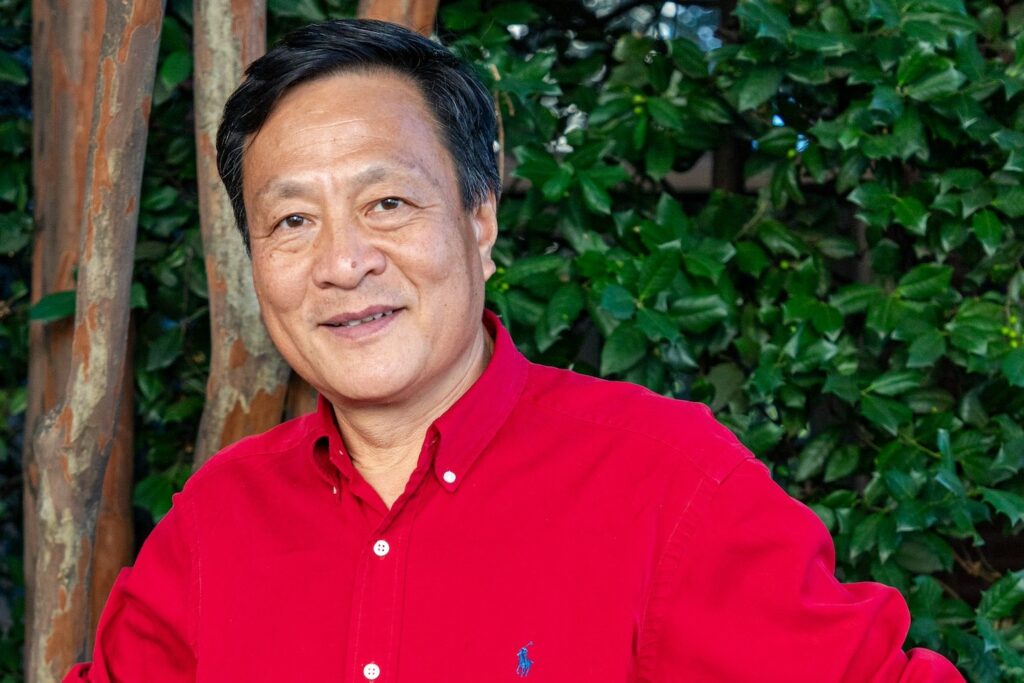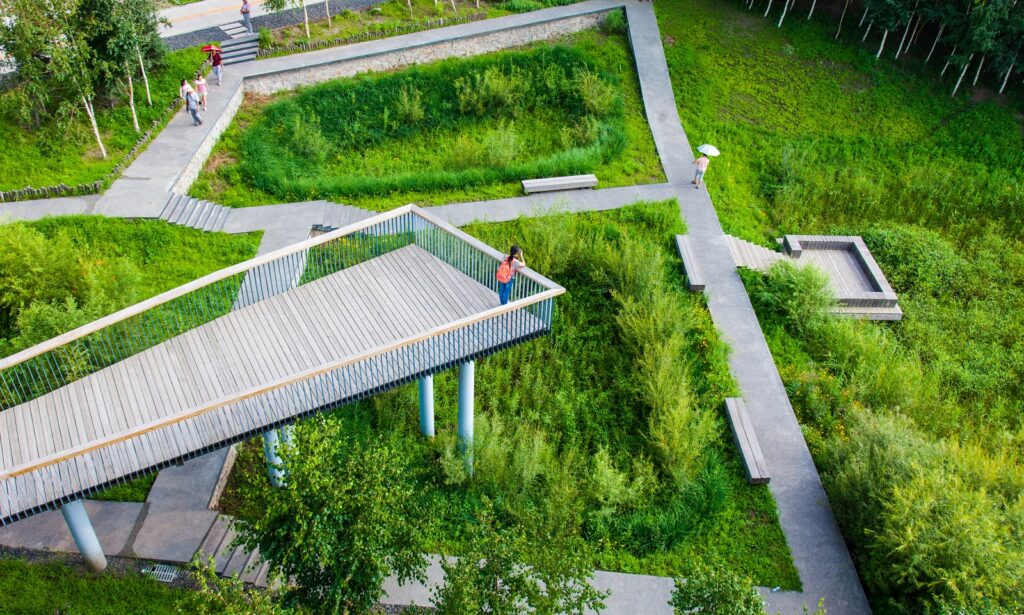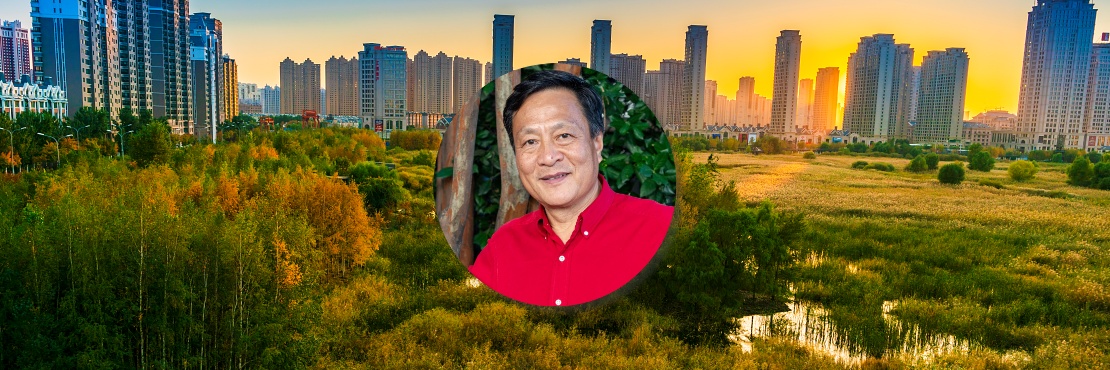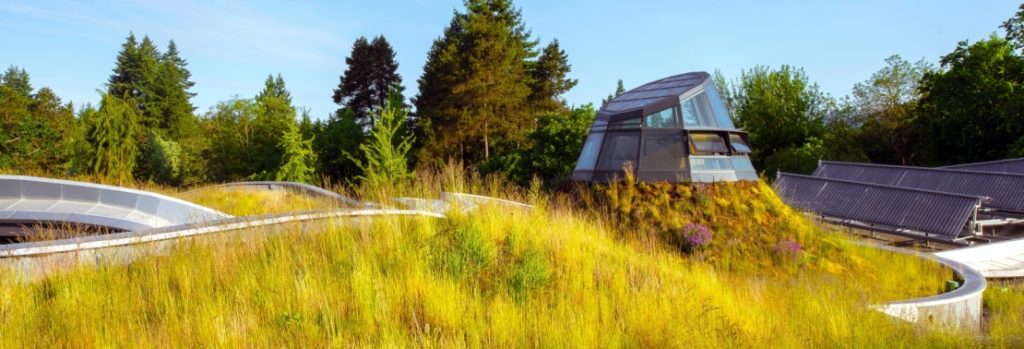Chinese Landscape Architect Kongjian Yu, Champion of “Sponge Cities” Concept for Addressing Climate Change Accelerated Urban Flooding, Wins 2023 Cornelia Hahn Oberlander International Landscape Architecture Prize
Biennial prize includes a $100,000 award and two years of public engagement activities
The Cultural Landscape Foundation (“TCLF”) announced that Beijing-based landscape architect Kongjian Yu is the recipient of the 2023 Cornelia Hahn Oberlander International Landscape Architecture Prize (“Oberlander Prize”). The biennial Oberlander Prize includes a $100,000 award and two years of public engagement activities focused on the laureate’s work and landscape architecture more broadly. Yu is the global champion of the “sponge cities” concept for addressing climate change accelerated urban flooding, which was adopted as national policy in China in 2013. The biennial Oberlander Prize is bestowed on a recipient who is “exceptionally talented, creative, courageous, and visionary” and has “a significant body of built work that exemplifies the art of landscape architecture.” Yu was selected by an international seven-person jury, supported by Oberlander Prize Curator John Beardsley, from more than 300 nominations worldwide. The Oberlander Prize Jury Citation noted of Yu, he is a “brilliant and prolific designer … [who] is also a force for progressive change in landscape architecture around the world.”
“He lives and breathes his conviction that landscape architecture is the discipline to lead effective responses to the climate crisis” said TCLF President & CEO Charles A. Birnbaum
Yu defines landscape architecture as the art of survival. “He lives and breathes his conviction that landscape architecture is the discipline to lead effective responses to the climate crisis,” said TCLF President & CEO Charles A. Birnbaum, “and his ideas are inspiring planners and decision makers in Australia, Bangladesh, Canada, Denmark, Egypt, England, India, Indonesia, Kenya, Mexico, The Netherlands, New Zealand, Russia, Singapore, South Africa, Sweden, and elsewhere.”
His “sponge cities” concept addresses climate change accelerated urban flooding with large-scale nature-based infrastructure – including constructed wetlands, greenways, parks, canopy tree and woodland protection, rain gardens, green roofs, permeable pavements, bioswales, other measures – that acts as sponges soaking up and storing rainfall instead of relying exclusively on traditional concrete reinforced riverbanks, dams, pipes, drains, and other conventional engineering solutions. Since being adopted as national policy in 2013, more than 70 cities in China have implemented the “sponge cities” concept with the goal that by 2030 80% of the cities would be able to absorb 70% of their rainfall.

2023 Oberlander Prize Laureate Kongjian Yu, 2023. Photo ©Barrett Doherty courtesy The Cultural Landscape Foundation.
About Kongjian Yu
Yu is the founder and leads the Graduate School of Landscape Architecture, and the College of Architecture and Landscape Architecture at Peking University. He is also founder and principal designer at the landscape architecture firm Turenscape, which today numbers some 400 employees. The firm’s name combines the characters “Tu” 土, which means dirt, earth, or land, and “Ren” 人, which means people, man, or human being. “Turen … means earth man, a relationship between land and people. The firm’s philosophy is to create … harmony between land and people and … sustainable environments for the future.” Yu received a Doctor of Design Degree from Harvard’s Graduate School of Design (1995) and is the author of more than twenty books and the founder and chief editor of internationally awarded magazine Landscape Architecture Frontier. He has been an invited lecturer, speaker, and guest professor around the world; he and his firm’s projects have received numerous awards.
The Oberlander Prize website includes a written biography of the laureate, a short introductory video with Yu, and videos about three significant projects: Zhongshan Shipyard Park (Zhongshan, China), Red Ribbon Park (Qinhuangdao, China), and Benjakitti Forest Park (Bangkok, Thailand).
Yu has been called the “Olmsted of China,” a reference to Frederick Law Olmsted, Sr., the influential founder of the landscape architecture profession in the United States and best known as the co-designer of New York City’s Central Park. However, Yu describes himself as a “peasant’s son” who was born in 1963 and raised in Dong Yu village in Jinhua, Zhejiang Province, which had a population of less than 500 people, a place he called a paradise. It is where the White Sand Creek flows down from the mountain through 36 weirs, which help facilitate crop irrigation, and into the Wujiang River. When the monsoon season-related flooding came, he says, the whole village would get excited because carp would swim up the creek from the Wujiang River to spawn, going over the low weirs, and into the fields and rice paddies where they were caught.

The Qunli Stormwater Park, Qunli New District, Haerbin City, Heilongjiang Province, China, 2014. Photo ©Turenscape courtesy The Cultural Landscape Foundation.
His pioneering research on Ecological Security Patterns (1995) and Ecological Infrastructure, Negative Planning and Sponge Cities (2003) has been adopted by the Chinese government (2014) as a guiding theory for nationwide ecological protection and restoration campaigns. He created Peking University’s landscape architecture department, which started with three students and has graduated more than 1,200 master’s and doctoral students. He helped shift Chinese national-level policies from economic development-centered urbanism toward ecologically prudent urbanism through numerous letters to top Chinese leaders and more than 600 lectures to mayors, ministers and almost all ranks of Chinese officials; numerous media appearances; and as a leading member of several national expert committees, including vice president of the Society of Urban Studies.
To date Yu and his firm have some 600 built projects in more than 200 cities, principally in China, but also in France, Indonesia, Russia, Singapore, Thailand, and the U.S.
About the Oberlander Prize
The biennial Cornelia Hahn Oberlander International Landscape Architecture Prize, which includes a $100,000 award and two years of public engagement activities, was created to increase the visibility, understanding, appreciation and conversation about landscape architecture. The New York Times called the prize’s namesake, Cornelia Hahn Oberlander, the “grande dame of landscape architecture” and reported she was “one of the first landscape architects to speak passionately about climate change and was an early adopter of storm-water-management systems and green roofs.”
About The Cultural Landscape Foundation
The Cultural Landscape Foundation (TCLF), founded in 1998, is a 501(c)(3) non-profit founded in 1998 to connect people to places. TCLF educates and engages the public to make our shared landscape heritage more visible, identify its value, and empower its stewards. Through its website, publishing, lectures, and other events, TCLF broadens support and understanding for cultural landscapes. TCLF is also home to the Cornelia Hahn Oberlander International Landscape Architecture Prize.
 Greenroofs.comConnecting the Planet + Living Architecture
Greenroofs.comConnecting the Planet + Living Architecture









